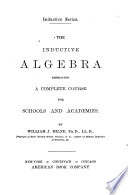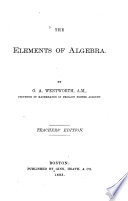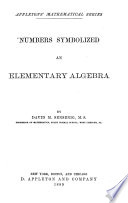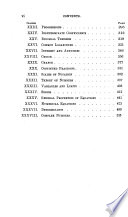 | William James Milne - Algebra - 1881 - 360 pages
...is 16, the common difference — 3^, and the sum of the terms 30. What is the number of terms ? 5. The sum of three numbers in arithmetical progression is 15, and the product of the second and third is 35. What are the numbers? 6. The sum of three numbers in arithmetical... | |
 | George Albert Wentworth - Algebra - 1883 - 506 pages
...d. n — 1 .-. 114 = -7 + (12-1)¿, 121 = 11 d. .: ¿=11. Hence, the means are 4, 15, 26 16. The rom of three numbers in arithmetical progression is 15, and the sum of their squares is 83. Find the numbers. Let ж - y, ж, ж + y = the numbers. Then (ж — y) + ж + (ж + y) = 15, 3ж =... | |
 | George Albert Wentworth - Algebra - 1886 - 284 pages
...fifteen terms of an arithmetical series is 600, and the common difference is 5. Find the first term. 14. The sum of three numbers in arithmetical progression is 15, and the sum of their squares is 83. Find the numbers. Let x — y, x, x + y represent the numbers. 15. Find three numbers of an arithmetical... | |
 | Charles Ambrose Van Velzer, Charles Sumner Slichter - Algebra - 1888 - 234 pages
...and the difference of whose third and seventh terms is 3 ? 21. The sum of the first three terms of an arithmetical progression is 15 and the sum of their squares is 83 ; find the common difference. 22. There are two arithmetical series which have the same common difference... | |
 | David Martin Sensenig - Algebra - 1889 - 388 pages
...each month for 10 years. What did the interest amount to at 6$, simple interest? 11. The sum of five numbers in arithmetical progression is 15, and the sum of their squares is 55. Find the numbers. мм <• p • 3n2 -4- n „ , 12. If the sum of n terms of a ser1es is ~ —... | |
 | George Albert Wentworth - Algebra - 1891 - 550 pages
...difference is 5. Find the first term. 15. Insert ten arithmetical means between — 7 and 114. 16. The sum of three numbers in arithmetical progression is 15, and the sum of their squares is 83. Find the numbers. Let x — y, X, x + y represent the numbers. 17. Arithmetical means are inserted... | |
 | George Albert Wentworth - Algebra - 1891 - 594 pages
...71— 1 .-. 114 = -7 + (12-l)d, 121 = 11 a. .-. a = 11. Hence, the means are 4, 15, 26 16. The sum.of three numbers in arithmetical progression is 15, and the sum of their squares is 83. Find the numbers. Let x — y, x, x + y = the numbers. Then (x 3z» + 2y' = 83. Substitute 5 for x,... | |
 | George Albert Wentworth - 1902 - 668 pages
...means between — 7 and 114. n-1 .-. 114 = 121 = 11 d. .: d=U. Hence, the means are 4, 15, 26, 16. The sum of three numbers in arithmetical progression is 15, and the sum of their squares is §3. Find the numbers. Let x — y, x, x + y = the numbers. Then (x .-. ж = 5. (.t - у)2 + z2 + (z... | |
 | John Marvin Colaw - Algebra - 1903 - 444 pages
...40. AVhat term is 11 ? 12. How many strokes does a common clock strike in 24 hours? 13. The sum of 3 numbers in arithmetical progression is 15, and the...of their squares is 83. What are the numbers ? Let the numbers be x - y, x, x + y. Then (x - y) + x + (x + y) = 15, (1) and (x - i/)2 + s? + (x + 0)2... | |
 | Edward Olney - Algebra - 1870 - 114 pages
...progression is 9, and the sum of their cubes is 153. What are the numbers ? Ans., 1, 3, and 5. (57.) The sum of three numbers in arithmetical progression is 15 ; and the sum of the squares of the two extremes is 58. What are the numbers ? (58.) There are four numbers in arithmetical... | |
| |